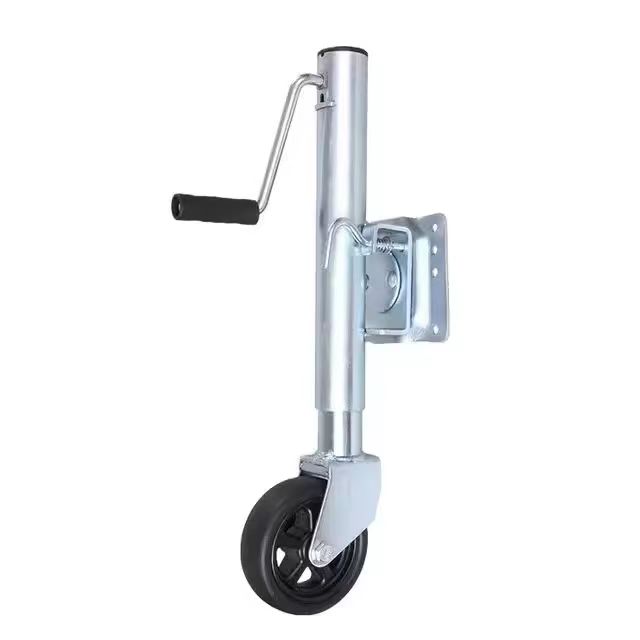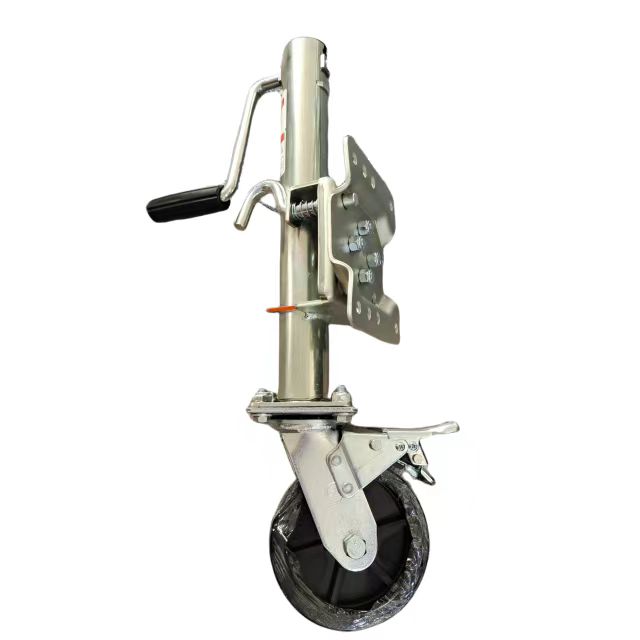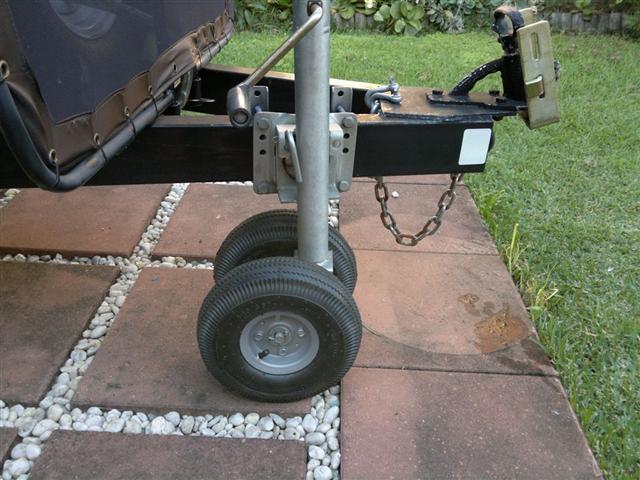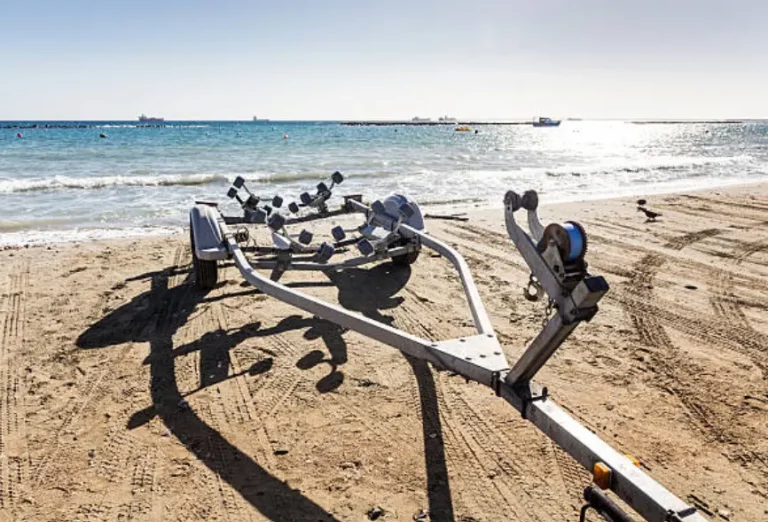Overview of a Jockey Wheel
What is a Jockey Wheel?
A jockey wheel is a pivotal component in the world of trailers, caravans, and similar haulage vehicles. This small yet mighty device is typically attached at the front of a trailer or caravan, serving as an additional wheel to facilitate mobility when the trailer is detached from the towing vehicle. Essentially, it contributes to the ease of maneuvering and stabilizing heavy trailers, making it an essential tool for anyone frequently towing heavy loads. Its function of providing both mobility and support underscores the importance of understanding its various aspects.
Different Types of Jockey Wheels
Jockey wheels come in various types to cater to different needs and load requirements. For instance, there are fixed jockey wheels, which are mounted securely and cannot be easily removed. They are best for consistent, heavy-duty usage. In contrast, swivel jockey wheels can pivot and swing up when not in use, making them perfect for users who need flexibility. More advanced options might include pneumatic jockey wheels, which feature air-filled tires offering better shock absorption and easier movement over rough terrain. Each type of jockey wheel is designed to serve specific functions, ensuring optimal performance and user convenience.
Basic Components of a Jockey Wheel
While a jockey wheel may appear simple, it comprises several key components that work together harmoniously. The main components include a sturdy metal frame, which provides the structural integrity required to bear heavy loads. The wheel itself can be solid rubber, pneumatic, or even made from high-performance plastics. The adjustable clamp or bracket allows the user to alter the height of the jockey wheel, which is crucial for alignment and stability. Moreover, some jockey wheels include a handle or winding mechanism to facilitate easy lifting and lowering. Together, these components ensure that the jockey wheel can support, stabilize, and maneuver the trailer efficiently.
Practical Uses of a Jockey Wheel
Assisting with Trailer Connection
One of the primary tasks that a jockey wheel accomplishes is assisting with trailer connection. Anyone who has tried to hitch a heavy trailer to a vehicle knows the difficulties involved. A jockey wheel simplifies this process by supporting the trailer’s front end and enabling easy movement toward the vehicle hitch. This functionality saves time and reduces the physical effort required for connecting heavy trailers.
Aligning with Vehicle Hitch
Precision is key when aligning a trailer with a vehicle hitch, and this is where the jockey wheel comes into play. By lifting the front end of the trailer, the jockey wheel allows you to easily adjust the height to match the vehicle’s hitch. This ensures a smooth and accurate alignment, avoiding the guesswork and multiple attempts that can become tiresome and frustrating. Not only does this make the process quicker, but it also ensures a safer and more secure connection.
Providing Mobility to Trailer
Mobility is another significant practical use of a jockey wheel. Once the trailer is detached from the tow vehicle, moving it around can be quite a task. A jockey wheel alleviates this challenge by acting as a fulcrum, giving the trailer front-end mobility. This makes it easier to move the trailer into tight spots or position it accurately. Whether you are parking the trailer in your driveway or maneuvering it around a campsite, the jockey wheel plays an indispensable role in providing the mobility needed.
Supporting Load Management
Load management is another critical function of a jockey wheel. Effective load distribution minimizes the risk of damage to the trailer and the towing vehicle. By evenly distributing the weight, the jockey wheel alleviates strain on specific points, fostering a balanced load that’s easier to manage.
Distributing Weight Evenly
A jockey wheel plays a paramount role in distributing the weight of the trailer evenly. This is especially important when dealing with uneven terrains or heavy loads. The even weight distribution ensures that the trailer remains stable, reducing the risk of tipping over. Additionally, this even load distribution can protect the towing vehicle from carrying the brunt of the weight, which can lead to wear and tear over time.
Preventing Strain on Tow Vehicle
By carrying a portion of the load, the jockey wheel helps to prevent excessive strain on the tow vehicle. This support can enhance the vehicle’s longevity and reduce maintenance costs over time. Without a jockey wheel, all the weight would rest on the vehicle’s hitch, leading to potential damage of the suspension system. The jockey wheel acts as a buffer, allowing for a smoother and more balanced towing experience.
Advantages of Using a Jockey Wheel
Ease of Maneuverability
One of the most significant advantages of a jockey wheel is the ease of maneuverability it provides. Whether you’re aligning the trailer with the vehicle hitch or pushing it into storage, a jockey wheel makes these tasks more manageable. It allows you to achieve the perfect alignment without extensive physical effort, making the entire process faster and more efficient.
Enhanced Stability and Balance
A jockey wheel provides enhanced stability and balance, ensuring the trailer does not tip or move unexpectedly. This stability is crucial, especially when loading or unloading the trailer or when it is stationary. The jockey wheel acts as an anchor, giving you peace of mind that your trailer will remain secure. Enhanced stability also translates into safer towing conditions, reducing risks on the road.
Reducing Manual Effort
Another significant benefit is the substantial reduction in manual effort. Attaching a trailer to a vehicle or moving it around can be labor-intensive, especially for larger loads. A jockey wheel alleviates this burden by taking on much of the physical load. This means you can complete these tasks without straining yourself, making the process safer and more pleasant.
How to Choose the Right Jockey Wheel for Your Needs
Considering Weight Capacity
When choosing a jockey wheel, it’s crucial to consider the weight capacity. The weight capacity determines how much load the jockey wheel can handle without failing. Ensure you select a jockey wheel that matches or exceeds the weight of your trailer. Overestimating the capacity can provide an added layer of security and longevity, as the jockey wheel will not be operating at its maximum limit.
Selecting the Suitable Material and Build Quality
The material and build quality of a jockey wheel are equally important. High-quality materials such as galvanized steel or durable plastics ensure the jockey wheel can withstand the elements and the rigors of frequent use. Opt for a jockey wheel with robust construction to avoid frequent replacements. Additionally, consider the type of wheel—whether solid rubber, pneumatic, or plastic—to match the terrain you will typically encounter.
Evaluating Height Adjustment Features
Height adjustment features allow for flexibility and ease in hitching and stabilizing your trailer. Consider a jockey wheel that offers a range of height adjustments to accommodate various towing vehicles and load conditions. The ability to fine-tune the height will make tasks like aligning the trailer with the hitch more straightforward, saving you time and effort. Look for a jockey wheel with a simple, reliable adjustment mechanism to ensure ease of use.
Go Trailer Parts, a professional trailer parts manufacturer based in Qingdao, China, specializes in manufacturing and supplying high-quality jockey wheels. Jockey wheels are versatile tools used to lift or move heavy vehicles or trailers, making it easier for users to repair or transport their vehicles. These jockey wheels are designed to facilitate parking, maneuvering, hitching, and unhitching trailers with precision and ease. One common scenario in which the jockey wheel is used is when parking or maneuvering a trailer into a tight spot. The jockey wheel allows the user to easily guide the trailer in the desired direction by simply rotating the wheel. This is especially useful when parking in a cramped garage or tight driveway. Another common use for the jockey wheel is when hitching or unhitching a trailer from a vehicle. The wheel can be used to raise or lower the trailer hitch to the appropriate height, making it easier to attach or detach from the vehicle.
The jockey wheel is also helpful when storing a trailer or caravan for an extended period of time. By using the wheel to raise the front of the trailer off the ground, it helps to prevent flat spots on the tires and reduces the risk of damage to the trailer’s suspension. Overall, the jockey wheel is a simple yet indispensable tool for anyone who needs to move trailers or caravans with ease and precision. Its versatility and ease of use make it a valuable asset for any trailer owner. Their 2000 pounds trailer jokey wheel and 1500lbs jockey wheel offer ideal solutions for consumers in need.
Maintenance Tips for Longevity
Regular Inspection and Cleaning
Regular inspection and cleaning can significantly extend the life of your jockey wheel. Examine the wheel, frame, and adjustment mechanism for signs of wear and tear. Ensure that all components are in good working order. Cleaning the jockey wheel after use, especially if exposed to dirt or salt, can prevent corrosion and keep it functioning smoothly.
Checking for Rust and Corrosion
Inspect the jockey wheel for rust and corrosion, especially if it’s made of metal parts. Rust can weaken the structural integrity and lead to failure over time. Use rust-removing agents to treat any affected areas immediately. Regular checks will catch potential issues early, preventing more severe problems down the line.
Lubricating Moving Parts
Lubricating the moving parts is essential for smooth operation. Apply a suitable lubricant to the axle, swivel mechanism, and any other moving parts to ensure they function correctly. This practice will reduce friction, minimize wear, and prolong the life of the jockey wheel. Regular lubrication is a simple task that yields significant benefits in terms of performance and durability.
Proper Storage When Not in Use
Proper storage of the jockey wheel when not in use will protect it from the elements and extend its lifespan. Store it in a dry, covered area to prevent rust and damage. If the jockey wheel is detachable, remove it and store it separately from the trailer to avoid exposure to harsh weather. Taking these simple steps will keep your jockey wheel in top condition, ready for use whenever needed.
Enhancing Your Towing Experience with a Jockey Wheel
A jockey wheel is an invaluable addition to any trailer setup, offering a range of benefits from ease of maneuverability to load support. By choosing the right trailer jockey wheel and maintaining it properly, you can ensure it serves its purpose effectively for years to come. Whether you’re a seasoned hauler or new to towing, understanding and utilizing a jockey wheel can significantly enhance your towing experience, making it safer, easier, and more efficient.








